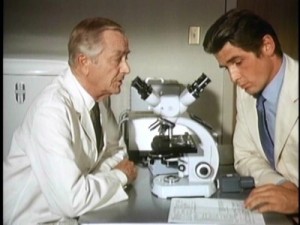 I‘m now a monthly guest blogger on ConsultantLive, and my first post appeared today. It’s the one where Marcus Welby gives a speech on the rewards of general practice as opposed to specialization.
I‘m now a monthly guest blogger on ConsultantLive, and my first post appeared today. It’s the one where Marcus Welby gives a speech on the rewards of general practice as opposed to specialization.
I’d like to give the ConsultantLive site a plug here, since I’m grateful for the opportunity they’ve extended to me. (Disclosure: My relationship with ConsultantLive is totally non-financial.) The site is designed for primary care physicians, with a special emphasis on practical advice that helps doctors diagnose and treat common medical problems. There are lots of graphics – some of them undoubtedly not too appealing to the lay reader. Doctors can receive CME (Continuing Medical Education) credits by reading articles online and answering questions on what they’ve learned.
My column on the site is called “How Health Happened.” It’s mainly about the history of 20th century medicine and how that relates to changing attitudes towards health. I’ll probably be writing more posts here that emphasize the history of medicine, especially in relation to primary care.
I found ConsultantLive through its sister site, Psychiatric Times, when I was writing about whether grief should be considered a symptom of depression in the forthcoming DSM-V. It’s interesting to read what psychiatrists are saying to each other these days, plus Psychiatric Times has a blog on the history of psychiatry – a subject I’d like to cover more often.
I just read an interesting article today that acknowledges serotonin levels appear to have nothing to do with depression. There’s a new theory about why antidepressants (sometimes) work – neurogenesis – but no one really knows at this point what works and why. That’s the thing about medicine and any science: It’s always changing, leaving its past for historians to record and maybe even learn from.
Related posts:
Marcus Welby vs. the specialists
Should grief be labeled and treated as depression?
Resources:
Image source: DVD Talk


Good news
We will follow on this site
Dr. Sonnet – Thank you for your kind words. And thank you for your interesting blog (Broken Heart Syndrome) on cardiology. It’s wonderful that you provide so much information in English for those of us who are not as bi-lingual as you are. I especially enjoyed your post “Fever in the heart of ancient Egypt” (http://bit.ly/1ry3Lf), pointing out what Egyptian medicine knew about the heart, blood vessels, and circulation as early as 1550 BC.
I read an article recently on how Egyptian medical practitioners specialized in parts of the body during the Ancient Kingdom (3200-2400 B.C.), something that didn’t arise in the West until the 19th century. (http://bit.ly/cg2E56) It’s by the Egyptian doctor and historian of medicine Paul Ghalioungi.
I’m sure most people in the West are unaware of the debt western medicine owes to Islamic scholars such as Avicenna, who was responsible for preserving the medicine of ancient Greece in medieval times and transmitting that knowledge to the West.
I wish you great success with your blog, and I hope that people of all cultures can come to understand and empathize with each other in these difficult times. (http://bit.ly/byX2dz)
Congratulations on your new assignment!
Thanks, Roberta.